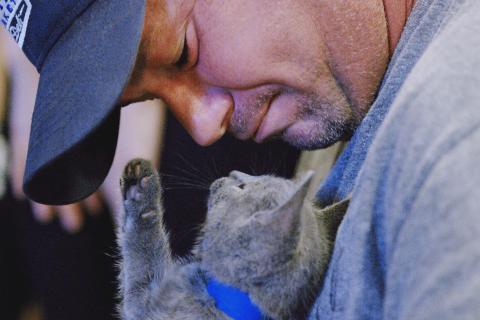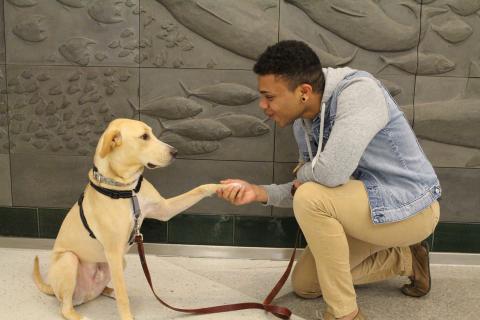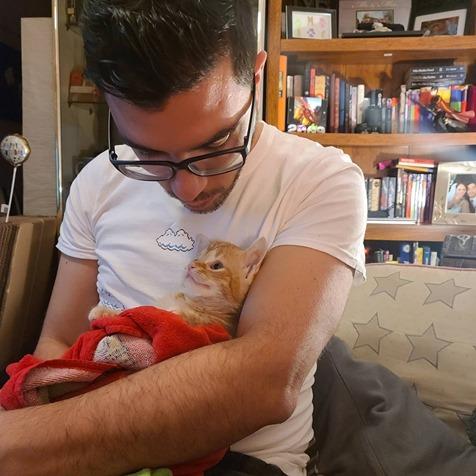As veterinarians, we are unfortunately familiar with pets that haven’t seen a vet in a while, or whose owners can’t afford the care their pets really need. Animal welfare organizations, rescues and shelters also know that those situations can lead to devastating impacts, difficult choices, and families separated.
At PetSmart Charities, we estimate that 50 million pets in the U.S. do not receive any veterinary care — even basic preventative care such as vaccinations and spay and neuter surgeries. In Canada, 1 in 5 pet parents have wanted or needed preventive care but haven’t been able to access it due to affordability or inability to get an appointment. There are many reasons for the lack of care, the primary being financial. But many pet parents simply can’t find a vet nearby, or a vet that speaks their language, or a vet with available appointments. These days, it’s not just underserved communities that have difficulty getting vet care. A shortage of veterinarians and rising costs means people of median incomes, living in thriving cities, struggle to get care, too.
The impact can be disastrous. Healthy communities require healthy pets. They’re critical family members and social connecters; plus, they offer emotional support and give their people a reason to get up and go outside. But when they can’t get the vet care they need, pets suffer and their families suffer, too.
What’s the answer?
The veterinary care challenge is a complex issue that will require partnership and innovation. We need the brightest minds to come together to try new solutions. As the leading funder of animal welfare in the U.S. and Canada, PetSmart Charities is investing $100 million in the U.S. and $18 million in Canada over the next five years to do our part to create change.
We are certainly not doing it alone; PetSmart Charities is excited to be partnering with top veterinary universities in the U.S. and Canada to tackle the biggest challenges to accessible veterinary care. With our support veterinarians, thought leaders, researchers and innovators will build programs that will address not only the challenges of today, but plan for tomorrow’s needs.
I’m excited to share some of the challenges we’re tackling with and great ideas we’re supporting through our robust university partnerships across the U.S. and Canada.
For starters, we don’t have great data about who isn’t able to access which kinds of veterinary care and why. Although we know 50 million pets in the United States receive no care, we could target our solutions better if we understood who was accessing which kinds of care and where the biggest gaps are. To help put a finer point on the problem, we partnered with the Ohio State University to research and share better data about the access to vet care challenge in the U.S. Additionally, Ontario Veterinary College is taking on the challenge of documenting what we know, researching the gaps, and bringing together leading voices to communicate more clearly about challenges across Canada.
One the biggest challenges is that the number of veterinarians is being outstripped by the growing pet population. A recent report estimated that we will be short 15,000 companion animal vets by 2030, and most clinics are already finding it impossible to stay fully staffed. We need to support our workforce as quickly as possible through innovation, improved training and clinic efficiency. We’re thrilled to be working with our visionary partners at Colorado State University (CSU) to build new training programs for mid-level veterinary practitioners that will build a more efficient, effective veterinary workforce. We’re also looking to support a grant for the University of Minnesota to research in the best ways to prepare students for this new world of community medicine, because understanding where we need to make adjustments within the veterinary education system to meet the needs of all pets and their owners will be critical in expanding access to care.
For some remote communities, finding a vet isn’t just difficult – it’s impossible. In remote Alaskan villages, where only airplanes and snowmobiles connect villages to one another, you just won’t find a standard veterinary clinic. In collaboration with Colorado State University (CSU), University of Alaska Fairbanks (UAF) and their unique veterinary training program for students from Alaska, young vets learn how to provide the kinds of community-based, mobile veterinary care that works best for so many communities in their home state. While they’re at it, our CSU and UAF partners are also building a model for partnership with native Alaskan communities and setting the standard for how community health can be supported through human and veterinary medicine working together.
Canadian northern communities have similar challenges and through partnership with Western College of Veterinary Medicine and the University of Calgary, we are challenging how we can better serve remote, isolated communities through innovative staffing models. Finally, the University of Calgary is leading the way in the development of long-term partnership with Indigenous communities that involve them in their pets’ care from the classroom to the clinic. They are grounding their students in the importance of listening to clients’ needs and being accessible, along with documenting research on the positive health benefits to communities and veterinarians when programs are responsive and community centered.
Other communities across the U.S. and Canada, are unable to access veterinary services because language barriers prevent them from interacting with the veterinary community. Spanish speakers have been turned away due to poor clinic signage, given mistranslated diagnoses or were unable to understand the follow up instructions for their pets’ care. Communication is the key to building trust, and we’re thrilled to have been able to support the research and development of a unique, online Spanish for Veterinarians language program developed by Colorado State University to help overcome this challenge for millions of pet-loving families.
We know 87.5% of veterinarians are white, and 62% are women. Encouraging and equipping diversity in the profession that mirrors our communities will give young people career role models and invite marginalized people and communities to participate, lead and invest in animal health. PetSmart Charities is working with several universities to enhance diversity and equity through scholarship programs that help remove some of the financial barriers to seeking a career in veterinary medicine.
Along with our established Steve Marton Scholarship program that awards $150,000 each year to three current veterinary students, we’ll continue as an organization to announce additional investments into doing our part through strategic alliances with universities that pave the path forward. It's true, we’ve got a big problem to solve. But when we align our resources, passion and intentions, together we can create more equitable solutions — For Pets. For People. For Good.









